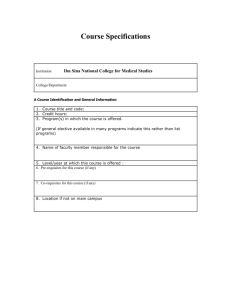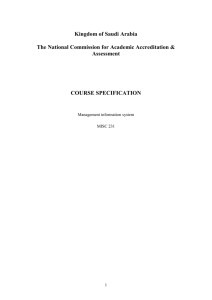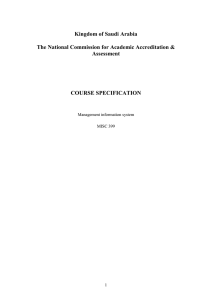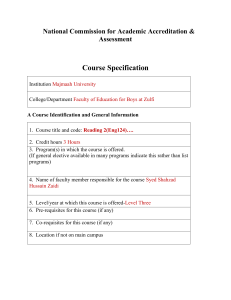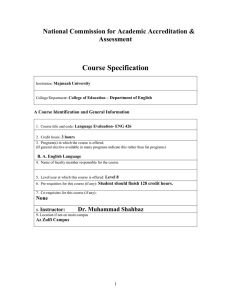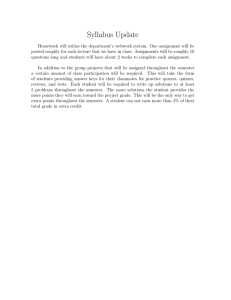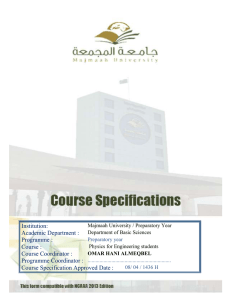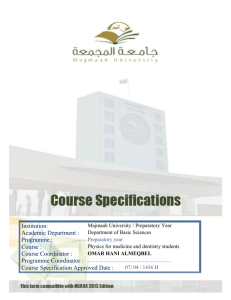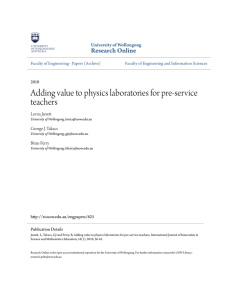CSR1
advertisement
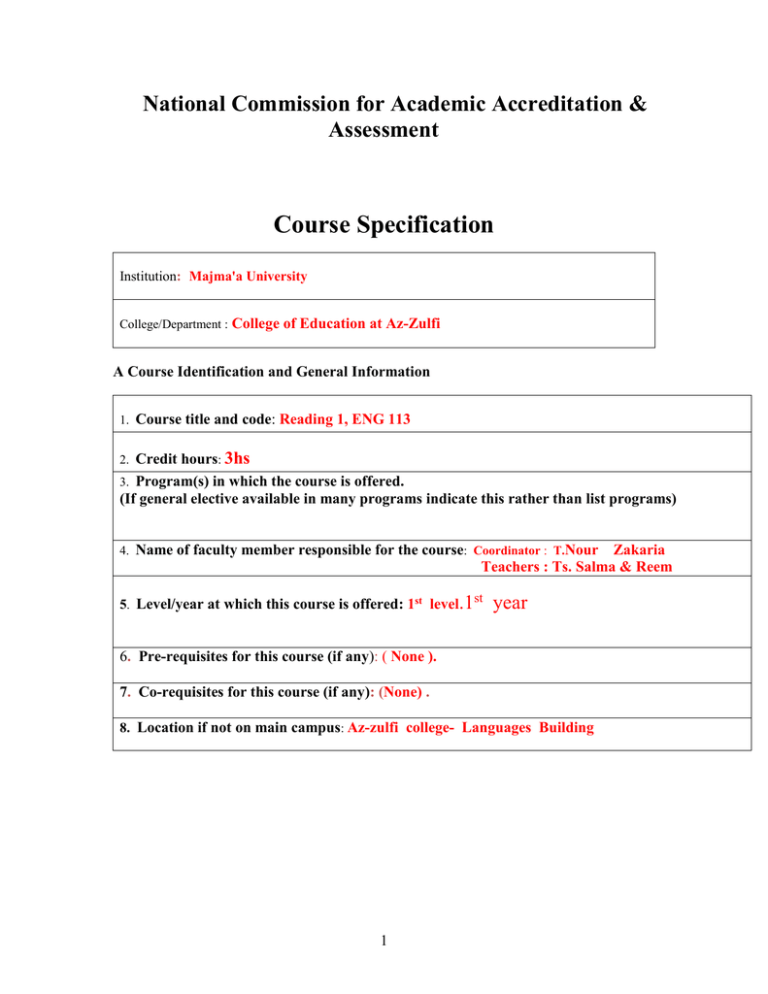
National Commission for Academic Accreditation & Assessment Course Specification Institution: Majma'a University College/Department : College of Education at Az-Zulfi A Course Identification and General Information 1. Course title and code: Reading 1, ENG 113 Credit hours: 3hs 3. Program(s) in which the course is offered. (If general elective available in many programs indicate this rather than list programs) 2. 4. Name of faculty member responsible for the course: Coordinator : T.Nour Zakaria Teachers : Ts. Salma & Reem 5. Level/year at which this course is offered: 1st level.1 st year 6. Pre-requisites for this course (if any): ( None ). 7. Co-requisites for this course (if any): (None) . 8. Location if not on main campus: Az-zulfi college- Languages Building 1 B Objectives Summary of the main learning outcomes for students enrolled in the course. At the end of the course students will be able to: 1. -Use the context to understand vocabulary items. -Summarize the paragraphs and find the main idea. -Comprehend the passage and answer the questions. 2. Briefly describe any plans for developing and improving the course that are being implemented. (e.g increased use of IT or web based reference material, changes in content as a result of new research in the field). Not available C. Course Description (Note: General description in the form to be used for the Bulletin or Handbook should be attached). 1 Topics to be Covered List of Topics No of Weeks 2 Contact hours Unit 2: How? Why? 2 6 Unit 3:Plants 2 6 Unit 4: Work and leisure 2 6 Unit 5: Interesting people of the world 2 6 Unit 6: Exploring and Adventure 2 6 Unit 1: Animals 2 6 2 Course components (total contact hours per semester): Lectures: Tutorial: Laboratory Practical/Field work/Internship Other: 36 hours 3. Additional private study/learning hours expected for students per week. (This should be an average :for the semester not a specific requirement in each week) 4. Development of Learning Outcomes in Domains of Learning For each of the domains of learning shown below indicate: A brief summary of the knowledge or skill the course is intended to develop. The ability of comprehending reading passages and developing vocabulary. A description of the teaching strategies to be used in the course to develop that knowledge or skill. 1. Collaborative learning. 2. Cooperative learning 3. Metacognitive strategy. 4. Critical thinking The methods of student assessment to be used in the course to evaluate learning outcomes in the domain concerned.. Participation / presentation a. Knowledge 3 / Homework / quizzes. 1. Description of the knowledge to be acquired. The ability of comprehending reading passages and developing vocabulary. (ii) Teaching strategies to be used to develop that knowledge 1. Metacognition strategy in which students should think about their reading then to monitor their understanding and fix any problems they have. 2. Cooperative learning in which students work together in small groups on a structured activity. They are individually accountable for their work, and the work of the group as a whole is also assessed. Cooperative groups work face-to-face and learn to work as a team. 1. Methods of assessment of knowledge acquired. 2. 3. 4. 5. Participation/ presentation Homework / quizzes Written mid-term exam Written final exam b. Cognitive Skills (i) Description of cognitive skills to be developed (ii) Teaching strategies to be used to develop these cognitive skills (iii) Critical thinking Co-operative- learning Methods of assessment of students cognitive skills Assignments - quizzes 4 c. Interpersonal Skills and Responsibility (i) Description of the interpersonal skills and capacity to carry responsibility to be developed Co-operative learning skill (ii) Teaching strategies to be used to develop these skills and abilities Work in groups d. Communication, Information Technology and Numerical Skills (i) Description of the skills to be developed in this domain. (ii) Using email, twitter, internet connection Teaching strategies to be used to develop these skills Presentation ,interaction between students . (iii) Methods of assessment of students numerical and communication skills Sharing home works e. Psychomotor Skills (if applicable) (i) Description of the psychomotor skills to be developed and the level of performance required Not available (ii) Teaching strategies to be used to develop these skills (iii) Methods of assessment of students psychomotor skills 5. Schedule of Assessment Tasks for Students During the Semester Assessment Assessment task (eg. essay, test, group project, examination etc.) Week due 1 2 3 4 Group Presentation Participation Quiz Homework Mid –term exam Written final exam Weekly Weekly 5th week Weekly 7th week 12th week 5 6 5 Proportion of Final Assessment 5% 5% 5% 5% 20% 60% D. Student Support 1. Arrangements for availability of teaching staff for individual student consultations and academic advice. (include amount of time teaching staff are expected to be available each week) Available by office hours: (Monday from 9 - 11) ( Tuesday from 9 - 11) E Learning Resources 1. Required Text(s): Ackert, P,. Lee, L. (2005). Reading and vocabulary development: Cause and effect (4th edition). Boston: Heinle, Cengage Learning. 2. Essential References Not available 3- Recommended Books and Reference Material (Journals, Reports, etc) (Attach List) Not available 4-.Electronic Materials, Web Sites etc http: / www.heinle.com 5- Other learning material such as computer-based programs/CD, professional standards/regulations Audio Tape ,Audio CD ,Answer key and Video Transcript F. Facilities Required Indicate requirements for the course including size of classrooms and laboratories (ie number of seats in classrooms and laboratories, extent of computer access etc.) 6 1. Accommodation (Lecture rooms, laboratories, etc.) Lectures rooms 2. Computing resources Two labs 3. Other resources (specify --eg. If specific laboratory equipment is required, list requirements or attach list) G Course Evaluation and Improvement Processes 1 Strategies for Obtaining Student Feedback on Effectiveness of Teaching Survey Personal communication Comments through the university portal 2 Other Strategies for Evaluation of Teaching by the Instructor or by the Department Survey Short visits 3 Processes for Improvement of Teaching Feedback from students 4. Processes for Verifying Standards of Student Achievement (eg. check marking by an independent member teaching staff of a sample of student work, periodic exchange and remarking of tests or a sample of assignments with staff at another institution) Peer review of the exams 7 5 Describe the planning arrangements for periodically reviewing course effectiveness and planning for improvement. Peer visits 8
